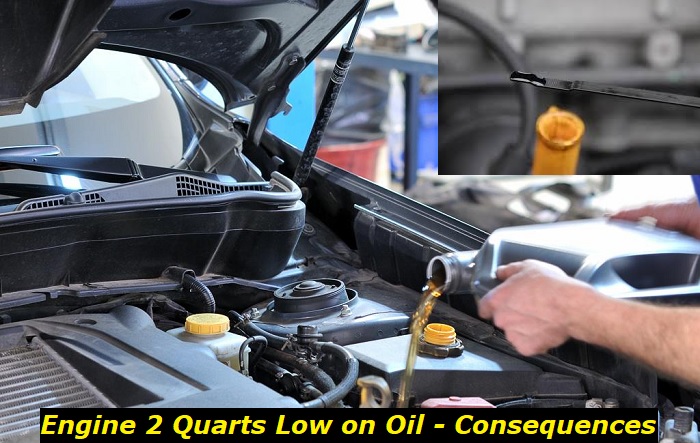If your car was 2 quarts low on oil, it's a serious issue and you shouldn't just ignore it. It's important to check that there are no damages and the engine can keep running. But how you can do this? The best option is to go to a good shop and ask a mechanic to do this. But there are some DIY things to try.
Oil consumption highlights
- Level of urgency:high
- Average mileage:over 100,000 miles
- Repair cost:$900 - $3,500
- DIY repair:possible but extremely complicated
- Commonreasons:worn-out valve seals, piston rings, internal engine problems, turbocharger problems
- If ignored:fatal engine damage, catalytic converter contamination, EGR system contamination
- How to solve:replace the worn-out parts, inspect the engine for oil consumptionreasons

Consequences of low oil level in your engine
The situation when your mechanic tells you after an oil change that the engine was running low on oil is pretty stressful. And if it was lacking 2 quarts of oil, it's a disaster for any machine. On average, the internal combustion engine will have 4 to 8 quarts of oil in it depending on the model. And if 2 quarts are missing, it's a lot. Really a lot!
But what can happen? Actually, the oil pressure should have gone low, too, so you may have seen the oil light on the dash and should have reacted somehow. But in some engines, like VW and Audi, the low oil pressure light is not that easy to trigger. It will go on the dash when it's too late to save the engine.
So, here are the possible problems the low oil level may cause:
- warped rod bearings - probably the most unpleasant thing that requires disassembling the entire engine to fix and this is going to be expensive;
- warped cylinders - when poorly lubricated, pistons may scratch cylinder walls and this will mean the end for your engine;
- damaged piston rings - the warping will cause piston rings to wear quickly and they will start leaking oil and pressure;
- bad valve lubrication, overheating of the head which may lead to stuck valves and problems with camshafts bearings;
- overall overheating of the engine due to metal parts rubbing against each other without proper lubrication;
- turbocharger failure because the turbo is one of the most lubrication-dependent parts in your engine.
These are just the most obvious things that may happen with your engine if it is running low on oil. The worst thing is that you will not know how long this has been happening because you aren't likely to check the oil level weekly even though car manufacturers ask you to do so in driver's manuals.
So, anyway, the problem is going to be pretty serious. But how possible are these issues? This depends on how long the engine was running low on oil. If it happened for several thousand miles, the problems are more than possible. If the problem was torturing the engine for two days, it may be completely OK.
Checking if the engine is affected
First of all, you need to make sure that your engine is not affected by the problem of low oil pressure. Unfortunately, it's not that easy to do. If you come to your mechanic with this question, they will offer several checkups that can take some time and cost you some money. So, maybe this is not the best option.
If you don't notice immediate problems with the engine, it may be one of the good signs. After the problem is fixed and the oil level is OK, you can try driving the vehicle. But it will take several careful steps to avoid extra damage.
Here they are:
- first, start the engine and let it idle and warm up;
- while it's warming up, take a chance and listen to how it sounds - doesn't it rattle or make some other sounds?
- after that, start driving and notice if the power is still available like before;
- if you feel any changes in how the engine works, you better stop the vehicle and consult with a specialist;
- if everything is OK, keep driving as you usually do and check the oil level every morning;
- badly affected engines will start burning oil and the level will fall pretty quickly;
- if everything is fine, the engine works well, has power, and doesn't burn oil, you may keep driving.
It's important to understand why 2 quarts of oil were missing. Most likely, the engine has already started burning oil, so you will have to pay more attention to the oil levels. Check it once a week or even more often to avoid issues.
Also, check the oil level before and after every long-distance trip. Even good and new engines can burn some oil when they work at high RPM for a prolonged period of time. So, make sure you know the level is good and turn this into a good habit to check the level once every week or so.
Why can your engine run low on oil?
Now, when you are sure that it's everything OK with the engine and it doesn't burn much oil, you need to ask yourself another question: how could this happen? 2 quarts are a lot and you need to figure out the possible reasons why this happened.
I can think of several things:
- There is a leak. Oil leaks are not uncommon and any engine can have this kind of problem. Sometimes, it's hard to locate leaks because you can't see the entire engine just by opening the hood.
- Oil burning in cylinders. If piston rings or valve seals are not OK, some oil will get into cylinders and will burn there together with fuel. This will gradually make the level lower.
- Initially low level. If an inexperienced mechanic changed oil in your engine, they could have added a little oil initially and you didn't check the level. In this case, the problems may be really serious.
- Wrong oil level checking. Please open the driver's manual for your car and find out how you should check the oil in your engine type. There are slight differences in the process.
So, these are the most obvious reasons why 2 quarts of oil may have been missing in your engine. You may be sure that if your engine burns some oil, this process will only deteriorate over time and soon you will need to repair the engine or even replace it.
Also, a lot of burning oil will affect other important units in your car. For example, it may cause carbon buildup on spark plugs and in the catalytic converter. Overall, emission control equipment won't be happy to get so much smoke from burning oil, so you will need to figure out how to cope with this.
How can you avoid the problems with low oil levels?
Actually, the low level of oil is one of the main issues that lead to engine death. So, it's important to understand how you can cope with it. If you develop the habits I will list in this section, you will be able to prolong the life of your engine or at least protect it from premature death.
Here are the routine things that will save your engine from low oil-level problems:
- Check the oil level regularly. At least once a month in a new car and once a week in a car that has more than 50K miles on it.
- Top up the oil if it's low. When the level is critically low, add some oil. But avoid mixing different types of oil and be careful with different brands.
- Change oil at least once a year. Also, make sure you keep up with mileage intervals that are stated by the car manufacturer.
- Buy high-quality oil and filters. When your car needs regular maintenance, don't spare those 3 bucks and buy proper oil and filters - this will save your engine.
- If you see black smoke from the pipe, have the car inspected. Black or grey smoke means that the oil is burning in the cylinders or in the turbocharger.
- If you see an oil light on the dash, stop the vehicle. The oil light means that there is a problem with oil pressure in the engine likely caused by low oil levels.
Remember these relatively simple recommendations and your engine will be OK. Also, the level is not the only important factor. The level may be OK, but the quality and properties of oil may not be good for your engine - keep up with all the maintenance recommendations and requirements.
Final thoughts
Checking the engine oil level regularly is extremely important to make sure that the engine is working in good condition. In this article, I've provided you with all the techniques that you can apply on your own and avoid problems with oil levels. Also, I've told you how you can check the engine after it has low oil level.
Be careful! The lubrication of your machine is extremely important and you shouldn't underestimate this factor. Plenty of engines die prematurely just because their owners don't care about oil-level questions.
About the authors
The CarAraC research team is composed of seasoned auto mechanics and automotive industry professionals, including individuals with advanced degrees and certifications in their field. Our team members boast prestigious credentials, reflecting their extensive knowledge and skills. These qualifications include: IMI: Institute of the Motor Industry, ASE-Certified Master Automobile Technicians; Coventry University, Graduate of MA in Automotive Journalism; Politecnico di Torino, Italy, MS Automotive Engineering; Ss. Cyril and Methodius University in Skopje, Mechanical University in Skopje; TOC Automotive College; DHA Suffa University, Department of Mechanical Engineering






Add comment